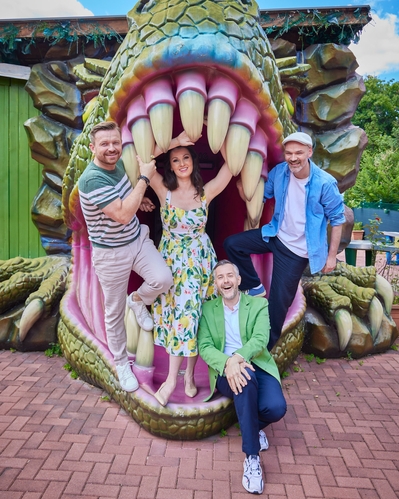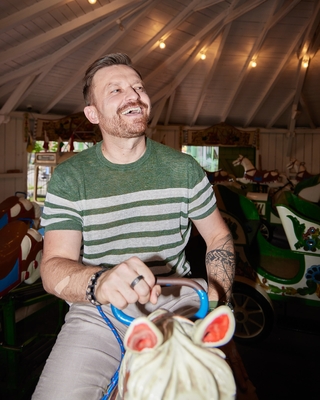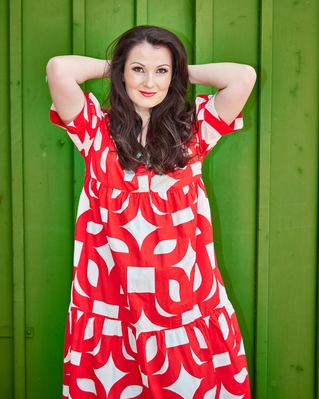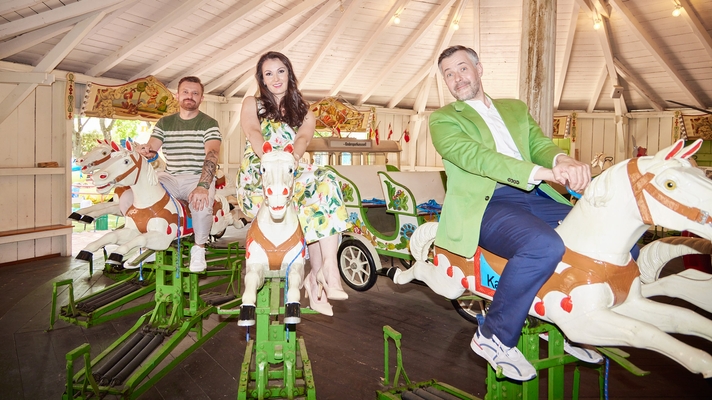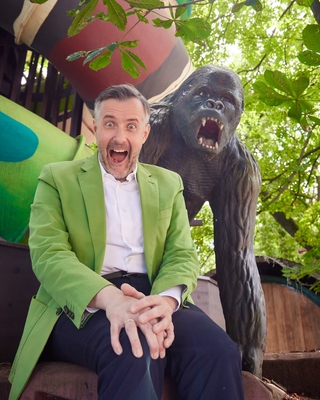Who gets the Czech Defiant?
Interview |
The more than three-decade-long interruption in the many generations of performances of The Bartered Bride at the Vienna State Opera was undoubtedly unplanned and a mere coincidence: The production, which had been staged since 1982, disappeared without a sound after 1991 - and a new one simply did not materialize. However, this break in tradition also meant that most of the members of the orchestra and choir were taking part in a performance of the work in this house for the first time on the premiere evening on September 28.
The situation is even worse with regard to the singers, as the cast list will feature state opera role debuts throughout (even if some of the soloists have already celebrated success with their respective roles elsewhere). In other words: There will be a real new start at the Haus am Ring - also for the audience.
Rehearsals have been underway since mid-June and so the following in-depth interview with the three main actors Slávka Zámečníková, Pavol Breslik and Michael Laurenz, alias Mařenka, Jeník and Vašek, took place just before the summer break. A first close encounter, so to speak.
The Bartered Bride has always been a big hit here at the Vienna State Opera, as they say. Almost like Die Fledermaus. And then the piece, which was at home on this stage, gradually disappeared and with it the knowledge of the work on the part of many in the auditorium. I would therefore like to start by asking you to briefly identify the characters, a description of the three characters you have given us.
Michael Laurenz: First of all, I would like to emphasize how great I think it is that important houses such as the Vienna and Bavarian State Operas, which have taken up the cause of large-scale repertoire, are once again embracing the operas of the 19th century. After all, composers such as Lortzing, Flotow or, in the case of The Bartered Bride, Smetana, can still count on a large audience for their wonderful works. Not least when the result is such intelligently modern scenic interpretations as, judging by the rehearsals, are on the cards in our case. And that brings me to "my" character, Vašek, who can be interpreted in very different ways. In the past, for example, he was very often presented as a consistently one-dimensional idiot. However, our director Dirk Schmeding pointed out during the concept discussion on the first day of rehearsals that he was particularly interested in the character development of all the actors. In the case of Vašek, this means a long overdue process of detachment from his morbidly patronizing mother and thus the transformation of an introverted nerd into a viable young man who ultimately knows what he wants.
Jeník also has to go through developments, but they begin much earlier in his case. Long before the actual action that you see and hear on stage.
Pavol Breslik: After his mother died at an early age and a stepmother who rejected him came into the house, he had to leave his home and make his way in the wide world on his own. Such traumatic experiences naturally do something to you! And now he has returned to the village, unrecognized by everyone, has won the heart of the beautiful Mařenka and finally wants to reveal to the world who his father is.
Slávka Zámečníková: But you don't want to talk to me about your traumas for a long time.
pb Right, because this is his sore spot. And when Mařenka says that people know little about his past, it's like salt on his wounds. You can also hear this beautifully in the music of his recitative: he barely begins to talk about his difficult childhood before a suppressed rage breaks through. He is one of those men who do not want to show how deeply they have been wounded. And Mařenka drills right into this again and again, thus bringing about a process of change in Jeník.
Mařenka simply dares to ask tricky questions that could potentially lead to unexpected, problematic situations. And that, in turn, helps her move forward internally.
pb After all, Mařenka needs to make some changes too! You come from a rich family, you've always had everything you wanted, and now you've got the coolest guy in the neighborhood..
sz No, Mařenka has never known any real problems..
pb But with the appearance of Vašek, the marriage candidate forced upon her, everything seems to suddenly start falling apart. And then she believes she has been betrayed by her lover..
sz You can literally hear it in her aria, how little she can believe it, how broken she suddenly seems, because the fulfillment of her dream to marry Jeník is in danger!
ml Even her initial insecurity causes her to overstep boundaries. The aversion, the open disgust shown towards Vašek, is striking!
sz It's true, it's interesting how much meanness towards Vašek suddenly bursts out of Mařenka, how hard she tries to unsettle and hurt him. It's not easy to portray this facet of her character, especially as I would never behave like this in real life. In any case, she deserves to believe that she's on the brink of a happy ending.
ml In her apology, however, it must be said that there are few ways out of arranged marriages.
sz And Mařenka does not yet know at this point that she will be strong enough to resist her parents. There is something else at play here: This Czech-Slovak way of thinking, which suggests to children that they owe their parents something in principle.
pb And unfortunately, little has changed in some sections of the population to this day. Even in adulthood, many still believe that they have to give something back to their parents in some way.
sz Ultimately, however, Mařenka quickly emancipates herself from these thought patterns. She realizes that she will not give herself up to ensure her father's prosperity. Not at the price of her happiness in love. But she is young and inexperienced and therefore doesn't know how to achieve her goal of marrying Jeník.
Of course, everything would be much easier if Mařenka had been privy to Jeník's plan. If she knew that Jeník was the older son of the rich Mícha and that she was only being 'sold' as a pretense, right?
pb If she listened just once, if she let Jeník finish just once, he could let Mařenka in on the plan. But her constant "I don't want to hear any more" naturally gets in the way.
sz Her problem is that she is indescribably defiant to begin with. I only realized the extent of this annoying character trait when I was rehearsing the role. I'm afraid I was quite similar in this respect as a 15-year-old. Mařenka is simply very young, doesn't know life yet and doesn't know what relationships and love really mean. Only this whole hullabaloo in the course of the plot, the misunderstandings, the struggle for the possibility of a life together, really brings Mařenka and Jeník together. Not least Mařenka's willingness to tone down her defiant behavior and listen better.
And what if she falls back into her old mistake of not listening? Couldn't Jeník then, in the event of a later marital rift, throw the sentence at her: "I wish you had married Vašek"?
sz Why should she fall back into this mistake? You learn from experience! Besides, I don't think the two of them will argue much..
pb Well, we'll certainly argue - after all, we do that in the opera too - but then we'll make up. And making up is always the best thing. (laughs) But Mařenka will certainly never hear a sentence like that from Jeník!
Let's get back to Mařenka's aversion to Vašek: the subtitle of The Bartered Bride is "Comic opera in three acts". But what's funny about an outsider like Vašek, who can't really defend himself, being treated nastily?
pb But at least the audience always feels sorry for him, he's like the opera's favorite character. Like Papageno in The Magic Flute.
But at least Papageno gets his Papagena.
ml And Vašek might get Esmeralda later - he really seems to have taken a liking to her.
And Mařenka? Was he in love with her too?
ml No, at least at the beginning you definitely can't speak of love here. Meeting Mařenka is more like a sensory overload for this young boy. Until then, he had always been under his mother's thumb and now he meets a woman for the first time, in the wild so to speak.
sz And a woman like that too!
ml To the prettiest girl in the village! Of course he's completely overwhelmed..
Now a question for the Slovakian: How much of your homeland do you discover in this opera?
pb The play undoubtedly reflects rural life in former Czechoslovakia. In fact, you can still find all these characters in some villages today. Even someone like the matchmaker Kecal. Or a Vašek, who nobody wanted to play with in kindergarten.
sz The opera is like a picture book based on reality. When I listen to the music, I feel transported back to my childhood and remember all the things I experienced in my home village. There is a very funny movie that we all grew up with, Slovaks and Czechs alike: Sun, hay and strawberries (Slunce, seno, jahody). And what is depicted there - set in a rural milieu in the late 20th century - corresponds with many of the situations and human aspects that are echoed in The Bartered Bride.
pb And the great thing is that Smetana composed music that captures precisely this feeling. It is not folk music, but the melodies, often in thirds, and the dotted rhythms, for example, create a very special atmosphere that seems to have been taken from the rural life of this region.
And how does a non-Slav approach this feeling?
ml I was initially an instrumentalist, I played the trumpet professionally for a very long time, and since it often happens in orchestral writing that two trumpets play melodies in thirds that are reminiscent of the folk music that is savored in every brass band, I am quite familiar with the feeling you are talking about, at least musically.
pb Unfortunately, Smetana, like Beethoven, wrote in an incredibly "unsinging" way, like someone who doesn't care at all about what voices are capable of.
In Vašek's central duet with Mařenka, things suddenly become very veristic. When it builds up towards the end of this number over the A and these semitone slips appear, the music no longer has anything Czech about it, it almost goes in the direction of Puccini, that is grand opera!
sz For someone like me, who currently mainly sings Gilda, Norina or Mozart, for example, it's super interesting to discover what the Czech repertoire feels like. Especially as there tends to be a tradition in Eastern Europe of casting everything with more dramatic voices.
pb Tradition is a terrible word. Tradition wants the Prince in Rusalka, for example, to be sung by more dramatic tenors. And yet there have been enough excellent, more lyrical interpreters of this role. But the further east you go, the more a voice becomes: The bigger, the better.
sz The typical Mozart voices are not as appreciated here at home as they are here in Vienna, for example.
ml Interesting what you say: the Jeník is basically almost reminiscent of a Mozart tenor, only it is set incredibly high, is constantly above the f sharp-g sharp formant change and therefore very difficult to sing. Mařenka is similar - a bit like a "Pamina plus" part. But if you follow this Czech music through to Janáček, the tenors and sopranos become even more dramatic, so you really do need spinto voices with a certain punch.
pb But unlike Smetana, Janáček sings well. Janáček took the Czech linguistic melody into account when composing. His written music looks very complicated, but it sounds extremely natural and that makes it easier. Not easy, but easier. Another difficulty with Smetana is that the singer has to give more than with Donizetti, Verdi or Mozart, because the orchestra goes along with the voices and doesn't just play an umtata-umtata accompaniment. This was less of a problem when The Bartered Bride was written, when the instruments had developed less volume due to their earlier construction and materials. But strictly speaking, the same applies to today's bel canto orchestra: today's instruments are not singer-friendly.
Finally, a very important question. When did you have your first Sold Bride experience- either as a spectator or as a performer?
sz I saw my first Sold Bride live at the age of sixteen and this experience was the deciding factor in my conscious decision to become a singer. So the piece was fateful for me.
pb My first contact with this opera was via television - it was a totally kitschy production by František Filip with Peter Dvorský and Gabriela Beňačková as Jeník and Mařenka: everyone was dressed in colorful traditional costumes and the village seemed to consist of gingerbread houses. In the meantime, I've been able to sing several different productions myself.
ml To be honest, before my Vašek debut in Munich, I only knew the opera from hearsay. But since that production, I've loved the work and the role, which you can really do a lot with.
